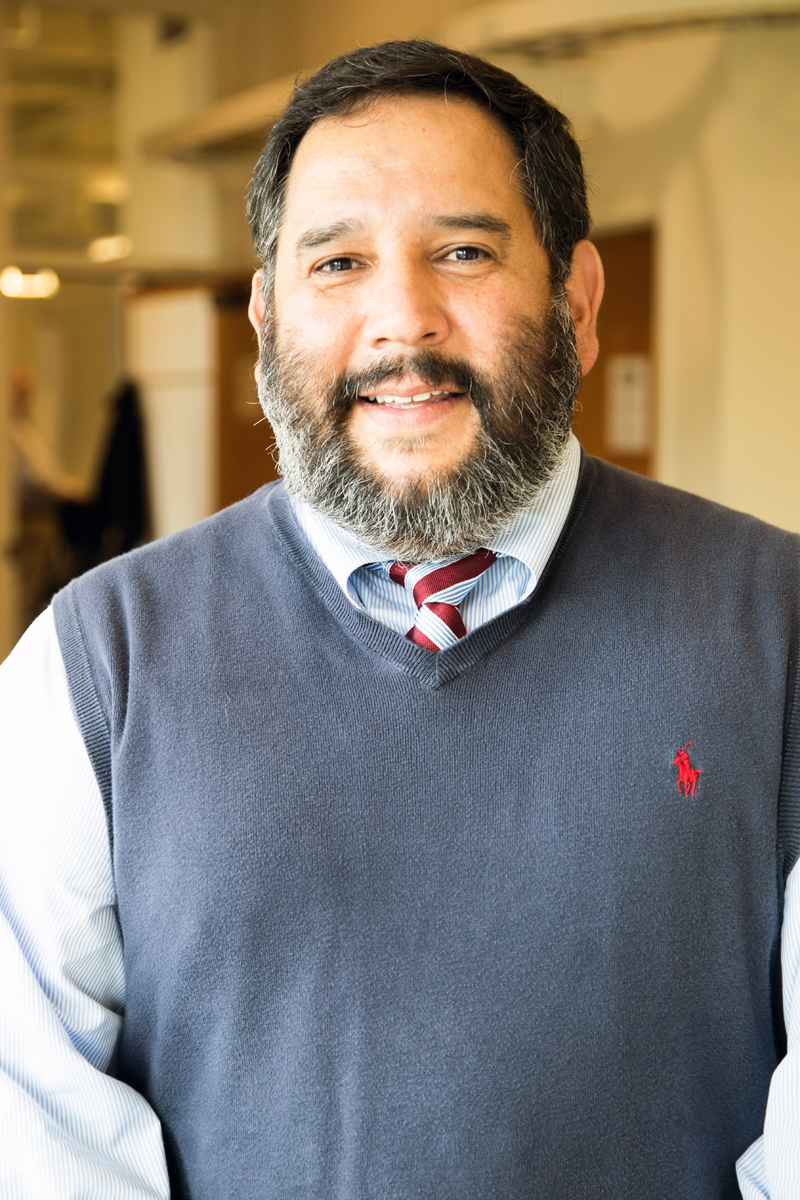Not many people come to the MEDEX physician assistant training program from a background of medical examiner investigator. Working for King County and Snohomish County Medical Examiners, Al Noriega responded to scenes of death, working alongside law enforcement to assist the pathologist in determining the cause and manner of deaths. “Any traumatic or violent death, suspicious death or unattended death, we would be called out to investigate,” Al says.
Now part of MEDEX Tacoma Class 3, Al is also grateful for his military background in this path leading him to prepare for a future career as a physician assistant. “I often think that the military led me to a program like this,” he states. “Every day that I spend here I realize this is where I should be. This is where I’m meant to be. There’s a reason we’re here, and it’s to help people.”
Al Noriega enlisted in the Navy when 18 years old and went to boot camp in San Diego. He was trained there as a corpsman at Balboa Naval Hospital before being sent to his first command at Marine Corps Base Camp Pendleton, CA, to serve with the US Marines. Later, Al was assigned to work at Naval Hospital Camp Pendleton in the intensive care unit, where he received much of his medical training that he used in the Navy.
After that tour of duty, Al was stationed onboard the USS Carl Vinson, a nuclear powered aircraft carrier out of Alameda near San Francisco. He did several cruises in a four-year tour with the Navy before getting out of active military duty.
Upon completion of his first tour in the Navy, he started working as a civilian medical assistant. “I did this while attending school and serving in the Navy Reserves.”
Eventually Al transitioned into an entirely new career direction—that of a forensic pathology assistant for the Kern County Sheriff/Coroner in Sothern California. After two years, the lure of a job brought him to Seattle where he also worked as an anesthesia technician for the University of Washington at Harborview. By day, Al worked in the operating room assisting anesthesiologists and at night as a full time investigator for the King County Medical Examiner’s office. After receiving a promotion, he eventually resigned his position at Harborview as an anesthesia technician. “I worked my way up to training investigator, then lead investigator,” he says, “which is a job I had for several years.”
The pull of the military remained strong, so in 1998 Al went back into the Naval Reserves as a reserve corpsman. “I was affiliated with the VR-61, which is an air wing squadron based out of Naval Air Station Whidbey Island, WA,” he said. “We provided logistical support to all branches of the military all over the world. After September 11, 2001, we were flying a high volume of missions with most of the deployments overseas in support of military operations. It took me away from my family and my work.”
During this time in the Naval Reserves, Al was assigned to a dual role of hospital corpsman and aircrew member for a medium-lift aviation squadron that provided logistical support missions moving small groups of individuals and supplies in support of Operations Iraqi and Enduring Freedom. “We would transport almost anything and for any service in support of these operations.”
As an aircrew member, Al worked on the maintenance and readiness of the aircraft in addition to his role as corpsman. “When I wasn’t fueling or maintaining the aircraft,” Al recalled, “I was maintaining medical records, providing shots, or working with the ship’s personnel on their health and well-being.”
Clearly, Al enjoyed his role in the US Navy. “I loved it,” he says. “I love serving my country, and I also liked working at the medical examiner’s office. So I tried to do both, to juggle both.”
In time, the frequent deployments became too difficult for family life and his civilian career. So in 2008, after a total of 13 years of service with the US Navy, Al turned his full attention to the private sector. “I still miss it,” he says, referring to the Navy.
Back in civilian life, Al continued his work for the medical examiner’s office, and in 2008 he accepted the position of Chief Investigator for the Snohomish County Medical Examiner in Everett, WA. Al attributes his medical training as a US Navy corpsman for his entry into that profession.
Al’s training as a corpsman provided him a foundation for efficiently yet thoroughly gathering crime scene information like medical history, medications, and injury patterns. From that information, he generated a report for the forensic pathologist, who then examined the body while looking at the medical records and history to make a determination as to whether the death was a homicide or suicide, accidental or natural. Al mentions that every forensic scene is different, and consistency is key in every scene. “We investigated drownings, hangings, vehicle accidents, overdoses, gunshot wounds and homicides.”
To hear this, one’s mind conjures up the intrigues of television crime shows like NCIS or Law & Order. But Al reports that reality is a lot harsher. After having kids, Al’s mind frame changed. “As death investigators, one sees a lot of the worst sides of life and death. And after becoming a father, it became more difficult to see some of these troubling things on a day-to-day basis. After over 15 years in the field of forensic death investigation, I told my wife, Jenny, that I thought I was done with death investigation.”
It was during that same time that Al reflected on his job satisfaction as a Navy corpsman. “I always enjoyed the time I was in the military when I treated patients,” he recalled. “They came in with a problem and I usually could help them out.”
Al discussed the possibility of medical school with his wife. “But when you do the math, it would have been too many years for a person my age.” He thought about the physician assistants he’d worked with in the military, specifically one of his most inspiring supervising officers— Mr. William Lussier— the first PA with whom Al worked. Al would go on to work with many other PAs both in the navy and civilian sector. “These guys were good. And the PAs in Snohomish Country and King County were all just remarkable too. They were very easy to speak to and communicate with.” That’s when Al turned to his wife, a full-time dentist who encouraged him by saying, “By all means, do it if that’s what you’d like to do.” Together they decided, “Let’s do it!”
The MEDEX Tacoma training location was the right choice for a couple reasons, the most important one being the military relationship. The MEDEX Northwest UW Tacoma campus has the largest number of military veterans across all four of the MEDEX sites. “The cohesion and camaraderie that a lot of military folks share is something that’s indescribable and very important to me,” Al says. The Joint Lewis McChord Base is within 12 miles of the MEDEX Tacoma site, and Naval Base Kitsap in Bremerton is 30 miles away. Proximity to both was a consideration with the establishment of the MEDEX Tacoma location in 2013.
Al recently completed his didactic year of the UW MEDEX PA Program and is embarking on his clinical year placements in the wider community.
He refers to the first year with MEDEX as “very challenging. It included a lot of complex material to learn. I have three little girls, and a very busy wife who runs her own dental practice and the house as well. I knew it was going to be tough but, without a doubt, it was more than what I anticipated. The subject matter is very interesting and it’s challenging stuff. But what is most challenging is the time management of trying not to go so deep into topics that you don’t have time to cover what’s relevant for now— just learn what is needed first without spending too much time on certain things that aren’t essential to know at this point in time.”
Al heaps high praise on the MEDEX faculty. “They’ve been phenomenal!” he says. “They put in the time and effort and made themselves available to help us. They were very, very proactive in trying to encourage us how to best utilize our time.”
Al stated that his fellow students of Tacoma Class 3 are also encouraging and willing to help out each other. “It’s a really unique and wonderful group of fellow students and friends.”
Come September, Al will begin his four-month family practice preceptorship. With three little daughters, he’s hoping for a placement close to his home in Seattle. “My wife would be very happy about that. She’s the real champ in my book as she’s carrying the majority of the load for our family.”
That preceptorship will be followed by six one-month rotations designed to expose him to a wide range of medical areas including surgical, inpatient, behavioral, and emergency medicine.
Al stops to reflect for a minute on his path to MEDEX: “I think my way of getting here was very unconventional. First the Navy, and then I was so entrenched in forensic pathology. I already had my career down, and this is like a third beginning. I could have stayed in familiar fields and not done something different. As it is, I’m older than most of my fellow students. But it probably doesn’t matter how or when you get here. It’s just that you’re here and the MEDEX faculty recognized the potential in all of us.”
After spending some time with Al, it’s easy to see why he was selected to join the MEDEX family. He’s a mission fit.
One of his main reasons for wanting to become a PA was “to give back.” From an early age and throughout his careers, Al has observed people who could not comprehend the specifics of their own healthcare, often to their detriment. It started with his own mother, who spoke only Spanish. “I remember going to the physician’s office with my mom and having to translate. I had a sense that my mom could have walked out and not understood what was going on.”
Much later while working in the medical field, Al would recognize this behavior again. “When I worked at Harborview, people would nod and leave. They’d say they understood, but you could tell they were scared and had trouble focusing on what was going on.”

All this drives Al’s vision for his future practice. “One of my goals is to be a really effective communicator and help people not only with treatments but also with comprehension about their medical illnesses or conditions. I want to be able to make certain that when patients leave the office they understand what’s going on in their body and they have an awareness of their treatment options. The diagnosis and outcome may be good or it may not be good. But I want them to feel that I have effectively explained to them what’s going on with their body— how they can improve things, how they can recover, how they can get treatment, and how their medication works.”
Given that Al is bilingual, he’s hoping for rotations that make use of his Spanish-speaking skills. “My mom is from Spain, so I grew up speaking Spanish to my mom and English to my father. I learned both languages simultaneously. I look forward to communicating with Spanish-speaking patients, and hopefully, providing them with greater understanding of how things work.”
As someone who spent a good number of years in the US Navy, Al found it unsettling to walk away and return to the civilian side. “There was always that apprehension that maybe I won’t be able to do it,” he mentioned.
Yet it’s clear that the military provided Al with the foundation he needed to succeed throughout all areas of his life. He’s clear that these skills are transferrable for medically trained veterans wanting to make the transition to the PA profession. “Confidence, accountability and responsibility—with those tools and the right work ethic, one has what it takes to do this if this is really what you want to do. It’s a lot of work—a lot more than I had anticipated. But it has proved to be worth it already. I haven’t completed the program yet, but I couldn’t be happier to be here and I’m incredibly humbled by the possibilities it offers.”
We remind Al that he’s already made it past one of the toughest parts of PA school—the didactic year of the two-year PA program.
“Yeah, well, one of the things that MEDEX pounds into you is that the learning doesn’t stop here,” he says with a big smile. “This is just the beginning, and I recognize that now. We’re just scratching the surface. There’s so much to learn, but I think that this makes you hungrier. It makes you really truly love medicine! And the more you understand it, the more you love it.”

